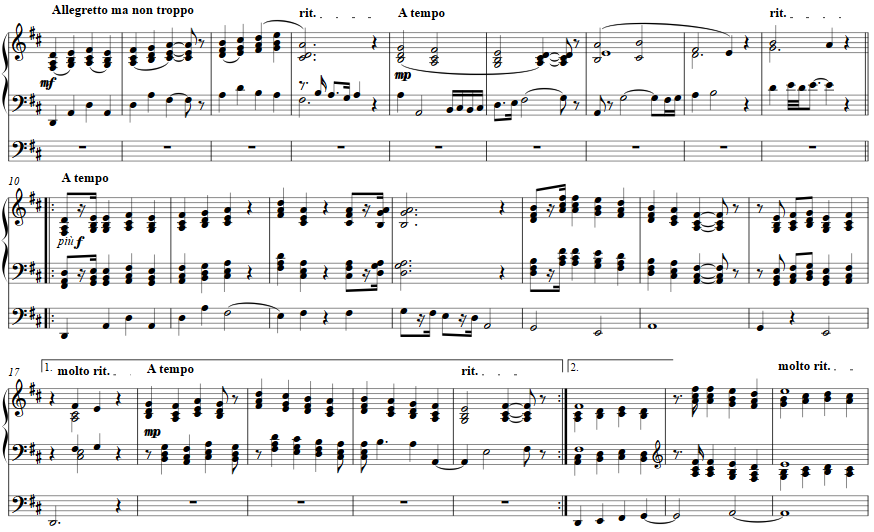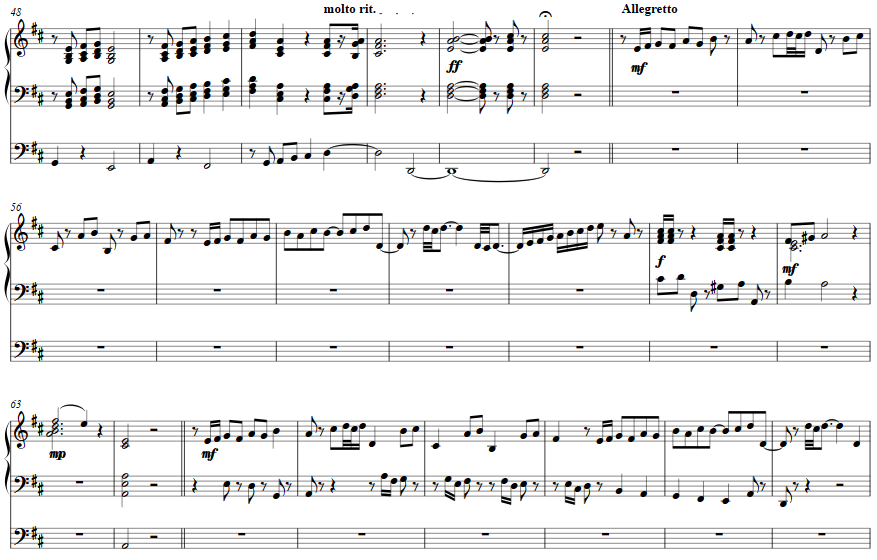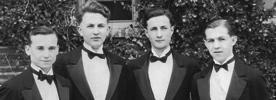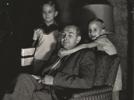Music and Texts of GARY BACHLUND
Vocal Music | Piano | Organ | Chamber Music | Orchestral | Articles and Commentary | Poems and Stories | Miscellany | FAQs
Processional and Fugue in D - (2021)
for organ
to the memory of my father, Gordon Bachlund, Sr.
Parallel first inversion chord forms sing out diatonically the opening statement, gently at first, and then with increasing loudness. The processional is a quasi-martial tempo is the shorter of the two sections, an extended fugue paired with it.
The fugue subject echoes the parallelism of the processional, now broken into single voices, the second half featuring the falling seventh in the falling arch before a cadence. Hints from Handel's 'Messiah' are buried within as episodic material, and some false relations or 'chromatic contradictions' adds to the otherwise triadic harmonies, and modulation to more than just the traditional dominant adds further complexity and a joyful, celebratory mood. The mediant plays its role in the scheme.
Our father, Gordon Bachlund, Sr. (1906-1958) was an accomplished musician, singer, teacher and choral conductor. He attended the University of Southern California, and sung in a male quartet (as above) as part of his musical activities. Later he attended Uppsala University in Sweden. He and our mother, Virginia, worked together often, she an accomplished pianist and organist. Of course, for the youngest sons, his stature within the Southland's church music and temple music communities was not a child's reality. That music filled the house had its predictable effect on me as the youngest for three musical sons. ( Alice
- an opera in two acts (2001-2013) is dedicated to her. )
A news article from several years before our father's death tells much in a short sketch.
"When 2000 singers at 4 p.m. next Sunday sweep the congregations of 65 congregations to their feet with the Hallelujah Chorus, it will be the ninth annual massed rendition of "The Messiah,"
each of them bigger and more representative than the last. And all of them a tribute to the indefatigable zeal and effort of Dr. Gordon Bachlund. He has not always been blind. One December morning in 1950 he drove to his office at the Church Federation building at 3330 W Adams Blvd., looked out the window at the greenery on the spacious lawn, read his mail, saw many people during the day and then suddenly, at about 4 p.m., his sight blacked out. He has been sightless ever since. An operation failed to save his sight, although it saved his life. But nothing has interfered with his management of the music commission of the two church organizations and so completely did he carry on despite the handicap that he has recently assumed even greater responsibilities. Dr. Bachlund long desired that his commission be expanded to include other of the fine arts, and he was named recently to head the Department of Worship and Fine Arts, of which the Music Commission will be a part. This would seem a stiff enough task for anyone, and almost impossible for one afflicted with blindness, but Dr. Bachlund does not see this as too great a handicap and those who work most closely with him agree. "It may seem amazing, but I had no serious adjustment to make," said Dr. Bachlund, who talks freely about his affliction. "I kept right on working, and I've been doing it ever since. I find blindness a nuisance only." The full-time efforts of his attractive wife Virginia have made it possible for hum to carry on as before, he said." In "Blind Man Makes 'Messiah' Succeed," by Dan L. Thrapp, Los Angeles Times, 27 November 1955.
From a 21 July 1954 notice printed in a local church bulletin, written by Pastor Schwertz: "After these past years in total darkness,
Dr. Bachlund has been largely dependent upon his family to take him to his work, on errands, and to business appointments. Since there has been given to him little hope of having his sight restored, it only follows that his desire for the privilege of being on his own should be encouraged. In consequence of this, he left by plane for the East where he is to secure and become the proud owner of a seeing-eye dog. in conversation with Mrs. Bachlund today we are advised that he has already been assigned a large 75-pound dog. It is necessary to spend a month in training for both the dog and his master. After this period, according to our information, the two become almost inseparable. Yes, we are all so happy this is to take place. No person is more deserving than our hard-working and faithful Dr. Bachlund. During his absence Mrs. Bachlund will be in complete charge of all the music. This will also include our telecast on August 15th. Thanks to you Mrs. Bachlund. Let us all pray for our genial choir director and for a successful trip, and a safe return."
Dad lived but four years more, passing at 51 from coronary thrombosis. The Los Angeles Times in August 1958 remembered: "Last Dec. 8, he had planned the traditional, simultaneous presentation in 75 churches,
sitting in his church office with telephones at hand as the 15,000 singers in the 75 choirs prepared to render the music to the accompaniment of as many organs and orchestras. Dr. Bachlund had normal vision until eight years ago. An emergency operation for a brain tumor saved his life at that time and he took up his duties again in the Church Federation Building, 3330 Adams Blvd. The zealous director, a native of Kingsburg, entered the hospital Tuesday evening and died early yesterday." It was learned in his passing that the brain tumor had returned and would have further devastated his life. As to blindness, he disarmed those who would say something like "how terrible it must be to be blind." His genial response? "As a musician, how much worse would it be to be deaf, and not be able to hear music?" Our home was a home filled with music, choral, solo and more, with art work for the many local artists they knew, and with the many musicians who visited the home. It was also filled with books in Braille, a red-tipped white cane and wonderful Seeing Eye German Shepherd dogs. For a small boy, it was a wonder. From today's perspective it remains that wonder, and more. How many lives are we as musicians privileged to touch? Dear friends, mentors and teachers colleagues and those many who we will never know but who have been affected by our music making.
One reads of Forrest Cleburne Wier, executive director of the Music Commission, from a program for the Twelfth Annual Festival performance in 1958, presented by the Department of Worship and the Arts, Church Federation and the Southern California Council of Churches, ""Memory of Dr. Bachlund's creative gifts to us and hundreds of thousands besides is fresh in our minds and lively in our hearts. Could a more fitting tribute to him be devised? May this hour bring to each of you a new and continuing sense of the Advent faith that now "God is with us,"
In more detail and in the somewhat anachronistic terms form that time, my father said: "There are no color lines; black yellow, red and white join in this effort, and there is no distinction as to creeds. We have choirs from Negro, Spanish-American, Japanese and Chinese churches." In "Messiah Sunday, the largest church music festival in America," from an interview with Dr. Gordon Bachlund, secured by Ralph Freese for 'Etude' Music Magazine, reprinted in "The Overture," volume 35, number 7, October 1955.
What a life of joy and blessing.
9 pages, circa 8' 30" an MP3 demo is here:

The score is available as a free PDF download, though any major commercial performance or recording of the work is prohibited without prior arrangement with the composer. Click on the graphic below for this organ score.




